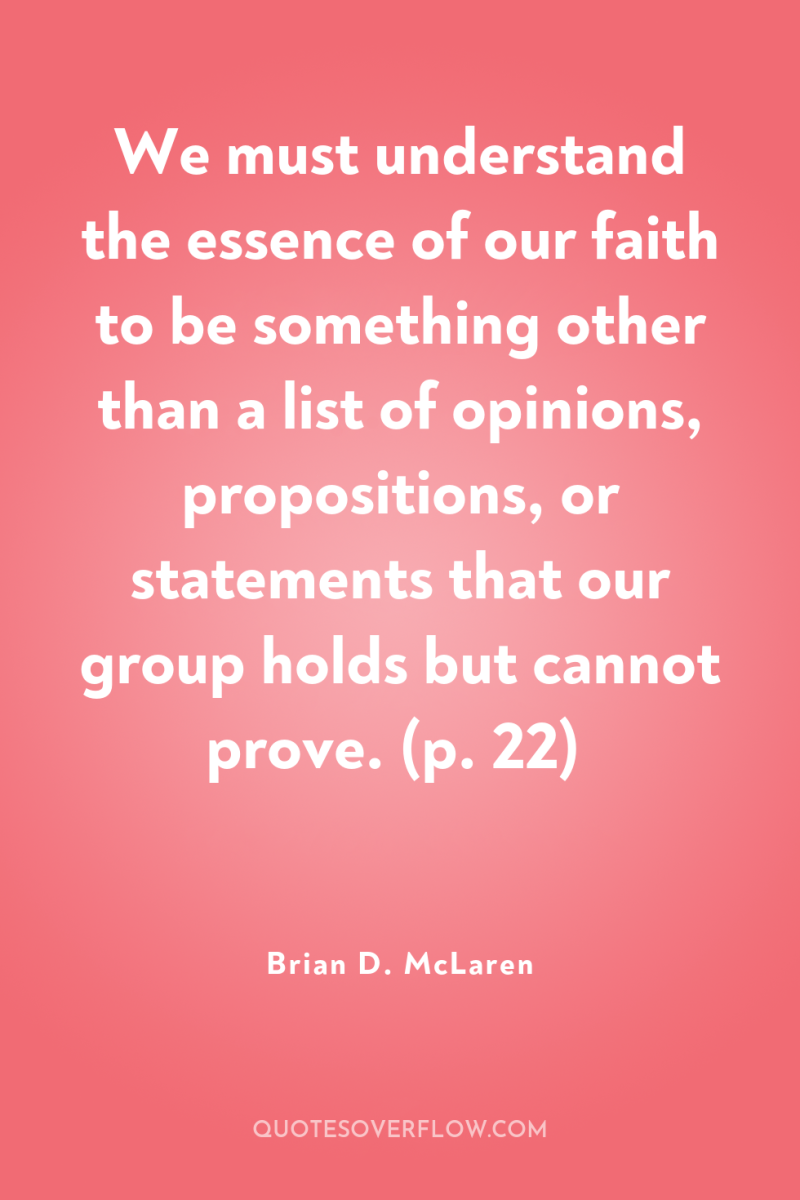
1
We must understand the essence of our faith to be something other than a list of opinions, propositions, or statements that our group holds but cannot prove. (p. 22)Brian D. McLaren
2
If you love someone, you will want to understand them and accept them as they grow and change; similarly, loving yourself involves a never-ending process of self-understanding and self-acceptance through life's ups and downs..we are finally coming to understand that love for neighbor and love for self naturally lead to love for the earth..if you love your neighbor as yourself, you want both them and you to be able to breathe, so you need to love clean fresh air..you want them and you to be able to drink, so you need to love pure water in all its forms..you want them and you to be be able to eat, so you need to care about the climate.." (p. 59-60) .Brian D. McLaren
3
Oppression theology and supremacist spirituality developed in the belief ecosystem of an angry God who needed appeasement in order to dispense grace, who favored some and disfavored others, and who welcomed the favored into religious institutions that accumulated and hoarded privilege and protected the status quo.Brian D. McLaren
4
If enough individuals are full of despair and anger in their hearts, there will be violence in the streets. If enough individuals are full of greed and fear in their hearts, there will be racism and oppression in society. You can't remove the external social symptoms without treating the corresponding internal personal diseases.. Pope Francis draws our attention to the 'invisible thread' of the market, which he describes as 'the mentality of profit at any price, with no concern for social exclusion or the destruction of nature.' This mentality generates inequality, which in turn generates 'a violence which no police, military, or intelligence resources can control'..changed individuals cross racial, religious, ethnic, class or political boundaries to build friendships. These friendship work like sutures, healing wounds in the social fabric. They 'humanize the other, ' making it harder for groups to stereotype or scapegoat. They create little zones where the beloved community is manifest.. They help people envision the common good--a situation where all are safe, free, and able to thrive. As my friend Shane Claiborne says, our problem isn't that rich people don't care about poor people; it's that all too often, rich people don't know any poor people. Knowing one another makes interpersonal change and reconciliation possible. (p. 167-168) .Brian D. McLaren
5
When our institutions lack movement to propel them forward, the Spirit, I believe, simply moves around them, like a current flowing around a rock in a stream..without that soul work that teaches us to open our deepest selves to God and ground our souls in love, no movement will succeed and no institution will stand..it is the linking of action and contemplation, great work and deep spirituality, that keeps goodness, rightness, beauty, and aliveness flowing..as Pope Francis has said, this moment calls for social poets: sincere and creative people who will rise on the wings of faith to catch the wind of the Spirit, the wind of justice, joy, and peace. (p. 180) .Brian D. McLaren
6
...churches would aim to take people at every age and ability level and help them become the most loving version of themselves possible. They would help people face the challenges of life--challenges that could make them bitter, self-absorbed, callous, or hateful--with openness, courage, and generosity. (p. 54)Brian D. McLaren
7
Growing numbers of us are acknowledging with grief that many forms of supremacy– Christian, white, male, heterosexual, and human–are deeply embedded not just in Christian history, but also in Christian theology. We are coming to see that in hallowed words like almighty, sovereignty, kingdom, dominion, supreme, elect, chosen, clean, remnant, sacrifice, lord, and even God, dangerous vices often lie hidden. We are coming to see in the life and teaching of Christ, and especially in the cross and resurrection of Christ, a radical rejection of dominating supremacy in all its forms. The theological term for [this] is kenosis, which means self-emptying. Rather than seizing, hoarding, and exercising power in the domineering ways of typical kings, conquistadors, and religious leaders, Jesus was consistently empowering others. He descended the ladders and pyramids of influence instead of climbing them upwards, released power instead of grasping at it, and served instead of dominating. He ultimately overturned all conventional understandings of . power by purging [it] of violence–to the point where he himself chose to be killed rather than kill.Brian D. McLaren